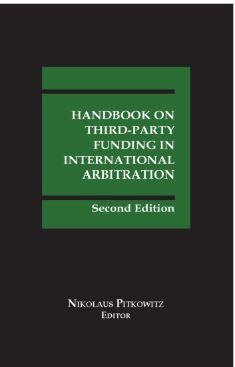Juris Publishing
Handbook on Third-Party Funding in International Arbitration 2nd ed
Handbook on Third-Party Funding in International Arbitration 2nd ed
Couldn't load pickup availability
The Handbook on Third-Party Funding in International Arbitration was created through the collaboration of the ABA Section of International Law - International Arbitration Committee, the International Council for Commercial Arbitration (ICCA) and the Centre on Regulation, Ethics and Rule of Law at Queen Mary, University of London. Their goal was to study, identify, and address the central issues and threats specific to the Third-Party Funding (TPF) context and to provide guidance to legal practitioners confronted with third-party funding in international arbitration.
The new second edition delves even deeper into the intricate landscape of third-party funding. The original roster has been expanded to 82 authors, all with stellar credentials and first-hand experience. They share their knowledge on the central issues and questions surrounding TPF as well as their local markets. Twelve chapters explore the third party funding landscape presenting readers with both the actor’s and funder’s perspectives, while 40 country-specific reports offer a comprehensive global guide on Third-Party Funding (TPF) in international arbitration. The new edition provides:
- Up-To-Date Analysis: Coverage of fundamental developments surrounding TPF and its impact on arbitration proceedings, including the most recent regulation efforts as well as developments in disclosure and cost allocation;
- Counsel Guidance: How to deal with existing and impending threats of TPF regarding (ethical) duties of counsel, confidentiality and disclosure;
- Practical Advice on Obtaining Funding: Showing how to find the right funder, what the role of funding brokers is, what market alternatives to TPF are available, and how the funder's case selection works
The Handbook on Third-Party Funding in International Arbitration, Second Edition, is a landmark resource that covers the most relevant issues surrounding third-party funding. As the demand for strategic funding solutions continues to shape the landscape of international arbitration, the Handbook continues to evolve and prove itself an indispensable companion for practitioners.
Contents:
Foreword
PART I. THE THIRD-PARTY FUNDING LANDSCAPE
Approaches to Defining Third-Party Funding
Maximilian Albert Müller
The Use of Funding Brokers and Advisors to Navigate Third-Party Funding
Charles M. Agee and Wendie Childress
The Regulation of Third-Party Funding in the EU
Ben Steinbrueck and Stefan Zeyher
Cost of Third-Party Funding- Selected Perspectives on Treatment and Recoverability
Colin Ong
PART II. THE ACTORS’ PERSPECTIVES
Potential Conflict of Interest between Arbitrators and Funders
Catherine A. Rodgers
Disclosure Obligations in Commercial and Investment Arbitration
Nikolaus Pitkowitz and Maximilian Albert Müller
Sources of Counsel's Duties to Non-clients in the Third-Party Context
Anthony Sebok
Third-Party Funding in Investment Arbitration
Victoria Shannon Sahani
PART III. THE FUNDER’S PERSPECTIVE
Case Selection and Commercial Terms of Funding Agreements
Mick Smith and Jeffery Commission
Funder's Case Evaluation and Legal Due Diligence
Ania Farren and Sonia Morton
Legal Finance – Different Types of Third-Party Funding and Alternatives
Andreas Jevtic and Alice Fremuth-Wolf
From Concept to Capital: A Guide to Third-Party Funding Agreements
Nikolaus Pitkowitz and Maximilian Albert Müller
PART IV. COUNTRY REPORTS
Albania
Alban Caushi
Austria
Nikolaus Pitkowitz and Maximilian Albert Müller
Belgium
Hakim Boularbah and Olivier van der Haegen
Bosnia and Herzegovina
Lejla Ademovic and Lejla Bošnjak
Brazil
Newton Lins de Noronha and Caio Cielo Nitz
Canada
James Plotkin and Thomas Yates
China
Wei Sun
Croatia
Dora Horvat and Petra Marijanović
Egypt
Mohamed S. Abdel Wahab
England & Wales
James Freeman and Pranay Lekhi
France
Jalal El Ahdab and Pierre Pic
Germany
Wolf von Bernuth
Hong Kong
Sherlin Hsie-lien Tung
Hungary
Sára Darnót, Péter Lakatos, and Balázs Fazakas
India
Arush Khanna and Rishika Jain
Ireland
Paula Gibbs
Japan
Aoi Inoue
Montenegro
Milan Lazić and Milica Volarev
The Netherlands
Thomas Stouten and Hans Biezenaar
North Macedonia
Bojana Paneva
Poland
Paweł Pietkiewicz and Krzysztof Popławski
Portugal
Duarte G. Henriques
Scotland
Brandon Malone and Frances Sim
Serbia
Milan Lazić and Milica Volarev
Singapore
Chen Siyuan and Louis Lau Yi Hang
Slovakia
Martin Magal and Beáta Ramljaková
Slovenia
Minu Anamaria Gvardjancic
South Korea
Robert Wachter and Hyunyang Koo
Spain
Guillermo Ruiz Medrano and Joan Braun Arañó
Sweden
Christoffer Monell
Switzerland
Simon Vorburger and Simon Weber
Turkiye
Simel Sarıalioğlu
Ukraine
Andriy Kulko and Irina Paliashvili
United Arab Emirates
Stuart Paterson, Janine Mallis, and Samuel Hunt
United States:
State of California
Amy Roebuck Frey and Lorna Maupilé Nicolson
District of Columbia
Kenneth B. Reisenfeld, Paul M. Levine, and Stephen Benz
State of Florida
C. Ryan Reetz
State of Georgia
Glenn P. Hendrix
State of Illinois
Lawrence Schaner
State of New York
Ina C. Popova and Christel Y. Tham
It's important to recognize that "third-party funding" intersects with several areas of international law and dispute resolution. Therefore, the relevant organizations are those involved in:
-
International Arbitration:
-
International Council for Commercial Arbitration (ICCA):
- This is a core organization involved in the book's creation. ICCA is a global NGO dedicated to promoting the use and improving the processes of arbitration and other forms of international dispute resolution.
- You can find them here: ICCA website: click here
-
International Centre for Settlement of Investment Disputes (ICSID):
- ICSID is part of the World Bank Group and provides facilities for the conciliation and arbitration of investment disputes between member states and investors.
- They are a very important part of the investment arbitration landscape, where third party funding is very relevant.
- You can find them here: ICSID website, click here
-
Permanent Court of Arbitration (PCA):
- The PCA is an intergovernmental organization with administrative support to facilitate arbitration, conciliation, and other forms of dispute resolution.
- You can find them here: PCA website: click here
-
International Council for Commercial Arbitration (ICCA):
-
Legal and Regulatory Bodies:
-
American Bar Association (ABA) Section of International Law:
- As a co-creator of the handbook, the ABA's international law section plays a significant role.
- You can find information relating to them through the main ABA website: click here
-
American Bar Association (ABA) Section of International Law:
-
Academic Institutions:
-
Centre on Regulation, Ethics and Rule of Law at Queen Mary, University of London:
- Another co-creator, this academic center contributes research and expertise.
- You can find information relating to them through the Queen Mary University of London website. Click here
-
Centre on Regulation, Ethics and Rule of Law at Queen Mary, University of London:
Key Considerations:
- The landscape of third-party funding is constantly evolving, with regulations and practices varying across jurisdictions.
- These organizations play a crucial role in shaping the discussions and developments surrounding TPF in international arbitration.
For more books on Arbitration, please click here.
Target Audience:
International Arbitration Practitioners, Litigation Finance Professionals, Corporate Legal Departments, International Law Firms, Arbitrators and Mediators, Legal Academics and Researchers, Investment Fund Managers, Risk Management Officers, Legal Consultants, Advanced Law Students


